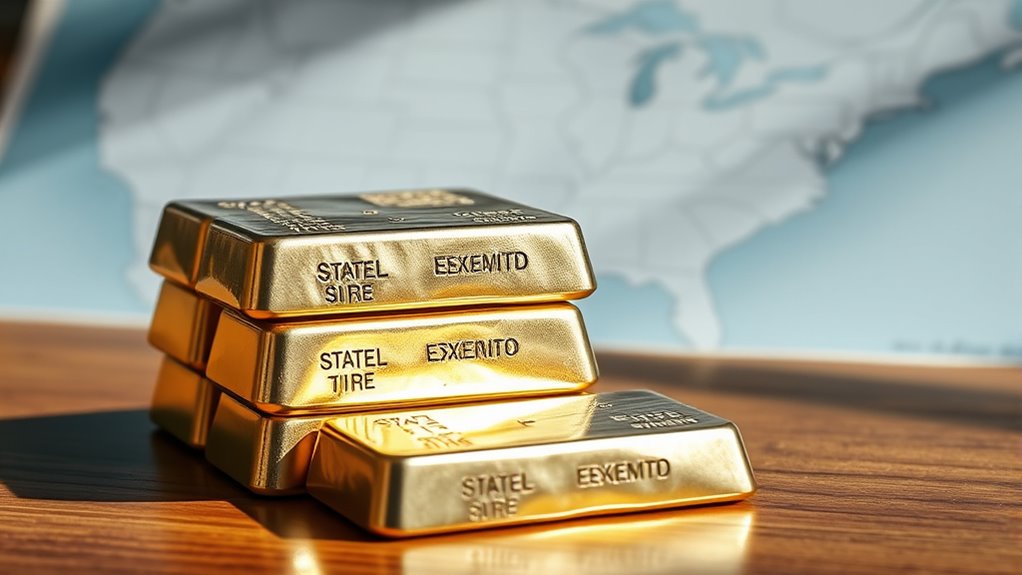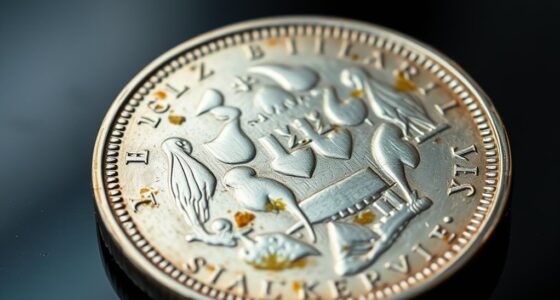If you want to maximize your IRA savings, focus on states without sales tax on bullion, like Alaska, Delaware, New Hampshire, Montana, and Oregon. These states exempt all bullion types, both online and in-person purchases, reducing costs. Recently, states like Alabama and Mississippi expanded exemptions, making bullion more affordable. Some states, such as Washington, are planning to reintroduce taxes. Keep exploring to discover how recent laws can help you save more on your bullion investments.
Key Takeaways
- Alaska, Delaware, New Hampshire, Montana, and Oregon fully exempt bullion from sales tax, maximizing IRA savings.
- Recent legislation in Alabama and Mississippi expanded bullion exemption scope, reducing purchase costs.
- States like Nevada and Kentucky offer limited exemptions, often with purity or type restrictions.
- Hawaii, Maine, New Mexico, and Vermont currently lack exemptions; Washington plans to reintroduce full tax in 2026.
- Legislative efforts aim to clarify bullion classifications and broaden exemptions, enhancing IRA investment advantages.

Understanding state sales-tax exemptions for bullion is essential if you’re buying precious metals as an investment or for collection. These exemptions can considerably lower your costs, especially when purchasing in states with favorable policies. Some states, including Alaska, Delaware, New Hampshire, Montana, and Oregon, do not impose any sales tax on bullion at all, making them ideal for tax-free purchases, whether you buy online or in person. Others like Alabama, Mississippi, Wisconsin, Kentucky, and New Jersey have implemented or expanded exemptions recently, allowing you to buy gold, silver, platinum, and palladium without paying sales tax. For example, Alabama’s exemption now covers various metals and formats, removing previous purity requirements, which broadens your options. Mississippi’s exemption, effective July 1, 2023, extends to coins, currency, and bullion based on their intrinsic metal value, making it easier to accumulate precious metals without added costs.
Some states exempt bullion from sales tax, reducing costs for investors and collectors.
In some states, the exemption is all-encompassing, covering all forms of bullion, coins, and currency, which can directly impact your IRA investments. When you purchase bullion in these states, you pay no sales tax, which means your investment grows faster because less of your capital goes toward taxes. States like Oregon and Delaware don’t impose any online sales tax, so buying bullion through online dealers becomes even more cost-effective. However, the landscape isn’t uniform. Certain states like Nevada and Kentucky offer only partial exemptions, often limited by purity standards or specific bullion types. In Kentucky, enforcement is currently in legal dispute, so tax collection on bullion sales remains unresolved until court decisions clarify the rules.
Some states, including Hawaii, Maine, New Mexico, Vermont, and Washington, still don’t have any sales tax relief on bullion, coins, or currency, which increases your costs when buying precious metals. Notably, Washington plans to repeal its exemption starting January 2026, reverting to full sales tax on bullion. These shifts highlight the ongoing political and fiscal debates over taxing precious metals, often leading to reversals of previously granted exemptions. Legislative efforts are also increasingly focusing on clarifying bullion classifications, which can impact exemption eligibility and simplify the purchasing process. Legislative trends also include expanding exemption coverage, making it easier for investors to benefit from favorable tax treatment. Additionally, some states are considering reducing regulatory hurdles, which could further streamline bullion purchases for individual investors. Recognizing the importance of state-specific laws, savvy investors often seek to optimize their purchases by understanding local policies. These legislative developments demonstrate a trend toward making precious metals more accessible and affordable for IRA investors and collectors alike.
Frequently Asked Questions
Do All States Offer Sales-Tax Exemptions for Bullion?
You might wonder if all states offer sales-tax exemptions for bullion. The answer is no. Some states, like Hawaii and Vermont, tax bullion sales, increasing your costs. Others, like Florida or Colorado, have historically provided exemptions but may change due to legislation or politics. Keep in mind, exemptions vary widely, so it’s essential to stay updated on your state’s laws to maximize your IRA savings.
Can I Use My IRA to Buy Bullion Tax-Free in Any State?
You might be surprised to learn that using your IRA to buy bullion isn’t always tax-free, but in certain states, it can be. States like Missouri, Mississippi, and Michigan exempt bullion from sales tax when purchased for an IRA, saving you money. Meanwhile, states such as Montana, New Hampshire, and Oregon have no sales tax at all, making IRA bullion purchases entirely tax-free. Check your state’s rules to maximize your IRA investment benefits.
Are There Specific Types of Bullion That Qualify for Exemptions?
You want to know which bullion types qualify for exemptions. Generally, IRS-approved gold, silver, platinum, and palladium bars or coins meet the criteria if they’re produced by approved refiners or mints and meet purity standards (like 0.995 for gold, 0.999 for silver). Eligible coins include American Gold Eagle or Canadian Maple Leaf, but collectible or non-standard coins usually don’t qualify. Make sure your bullion is IRS-approved for IRA inclusion.
How Do I Prove My Bullion Purchase Is Tax-Exempt?
To prove your bullion purchase is tax-exempt, keep all your receipts and invoices showing the bullion type, weight, purity, price, and seller details. Make certain you have exemption claim statements or certifications from the seller or authorities. If you pay sales tax accidentally, retain proof of payment and file for a refund. Always use reputable dealers, and check specific state requirements to ensure your documentation meets local standards.
What Are the Penalties for Incorrect Tax Exemption Claims?
Think of claiming a tax exemption as steering a ship through treacherous waters—you need precise navigation. If you make an incorrect claim, the IRS can impose penalties like a storm damaging your vessel. You might face a 20% penalty on the understated amount, plus interest, making your journey costlier. To avoid this, keep detailed records, understand local laws, and seek professional advice to stay on course.
Conclusion
By taking advantage of state sales-tax exemptions for bullion, you can maximize your IRA savings and keep more of your wealth growing. Did you know that over 40 states offer some form of exemption? That’s a significant opportunity to reduce costs and boost your investment’s potential. So, make sure to verify your state’s rules—you might be leaving money on the table without even realizing it. Staying informed helps ensure your retirement plan works harder for you.
Helen brings a wealth of experience in investment strategy and a deep passion for helping individuals achieve their retirement goals. With a keen understanding of market dynamics, Helen has been instrumental in shaping the vision and direction of Gold IRA Markets. She specializes in creating innovative solutions that align with our clients’ long-term investment objectives.










